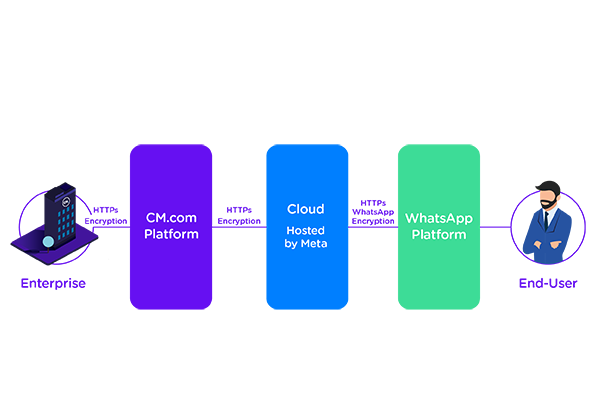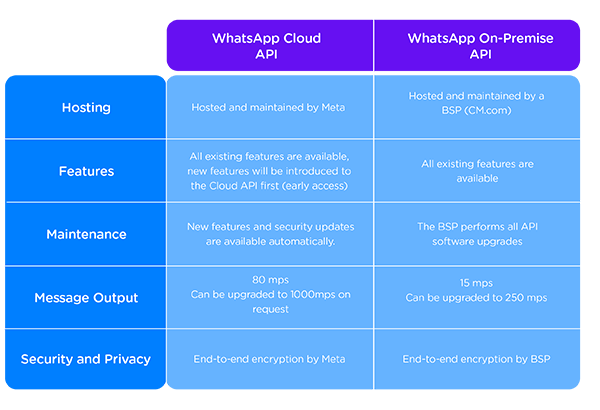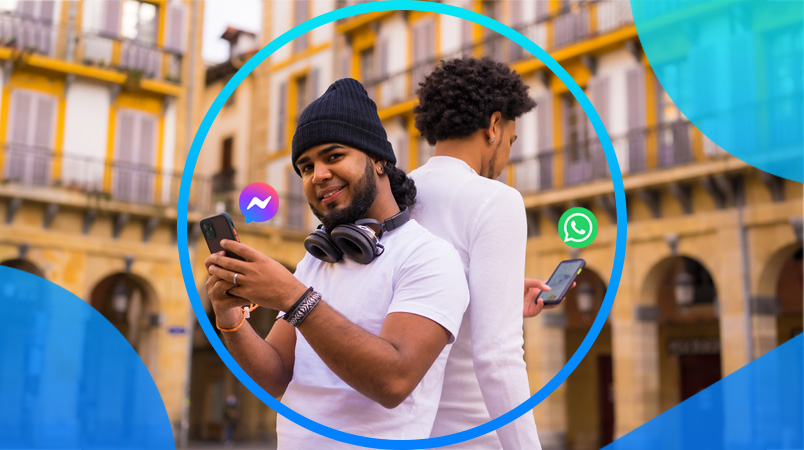WhatsApp Business Platform
WhatsApp is one of the most popular messaging apps. Statistics show that two billion people across the world use WhatsApp on a monthly basis, making it the most-used mobile messaging channel. Businesses across the world have been using the WhatsApp Business Platform to leverage the benefits of this channel for their own growth. Answering customer questions, providing support, boosting sales, sending notifications, and any other use case you can think of, it's all possible with the WhatsApp Business Platform.
Recently, WhatsApp has introduced a cloud-based version of its platform, hosted by Meta (you know, the people behind Facebook, WhatsApp, Instagram, and many other things) to help make WhatsApp Business more accessible to businesses.
How does the WhatsApp Cloud API differ from the original On-Premise API set-up? And which software solution is the right fit for your business? Let's find out!
WhatsApp On-Premise API
Meta first offered WhatsApp Business via a GDPR-compliant on-premise REST API protocol called the WhatsApp On-Premise API. The API software is hosted individually or by Business Service Providers (BSPs), such as CM.com. This means that the software is installed and runs on the BSP's infrastructure.
WhatsApp Cloud API
In 2022, Meta released the WhatsApp Cloud API, not as a replacement for the WhatsApp On-Premise API, but as an additional option for different use cases or goals. The Cloud API allows businesses to send and receive all types of messages and media, just like the On-Premise API, with additional features. In fact, the Cloud API will become the preferred platform for new, interactive features that enable automation and help you boost conversion.
WhatsApp Cloud API Key Features
End-to-end encryption by Meta instead of a BSP.
Earlier access to new product features
Automatic upgrading
A higher message output than on the on-premise API
Emoji Reactions are made possible, similar to the WhatsApp Chat feature
Contrary to the On-Premise API, the Cloud API is hosted by Meta cloud servers, with data storage centers in the UK and the US. These servers are, of course, GDPR-compliant.

The Cloud API is based on the Facebook Graph API, which encompasses most Meta products, including Instagram and WhatsApp. Also interesting, especially for the developers among us, is that the Graph API is an HTTP-based API that can be used to programmatically query data, post new stories, manage ads, and upload photos, among other things.
Differences Between the Cloud API and the On-Premise API in a Nutshell

Pick the Most Suitable WhatsApp Business Platform API for Your Business
Let's start by agreeing that the choice between the On-Premise API and the Cloud API depends heavily on the use cases and goals you set for your WhatsApp Business strategy. The features of WhatsApp Business Platform are roughly the same on both APIs, with slight differences in hosting, pricing, and feature adoption.
Where the Cloud API’s cost-effectiveness and additional new features might seem perfect for some, the hosting services of the On-Premise API can be a key motivator for others.
To really understand what would be the best fit for your business, our experts are happy to brainstorm the possibilities with you.








